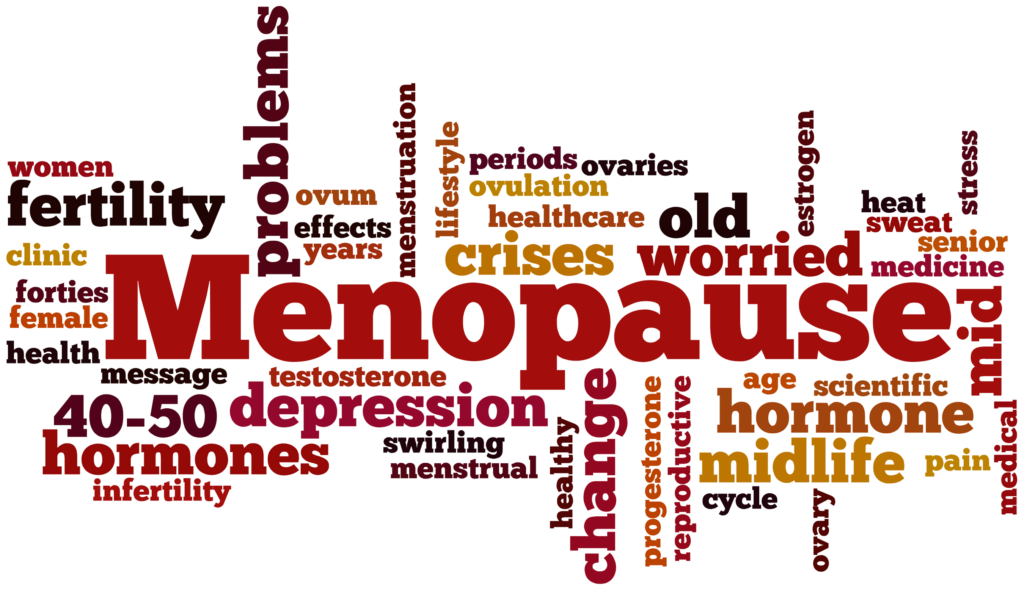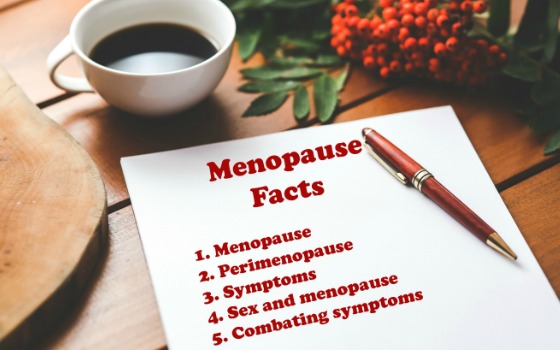Do you know what day today is? Aside from being Wednesday, October 18, today is also World Menopause Day!
How dialed in are you to menopause? Let’s discuss menopause, shall we?

Let’s chat about menopause.
I want to talk about a few things women seldom want to discuss; things we speak of behind closed doors or in hushed tones; things we’re sometimes even hesitant to talk about with our gynecologist. I want to talk about incontinence, loss of libido, brain fog and more. Recognize these? They’re all symptoms of menopause.
There’s nothing dirty or embarrassing about these words. They’re perfectly normal. So, why are we reluctant to talk about the things that pertain specifically to our beautiful bodies?
Menopause is a natural progression in life, and it comes with an array of symptoms, some more common than others. There are at least 34 symptoms of menopause, and each woman’s menopause journey will be different.
Below are some of the conversations we shy away from when it comes to menopause:
Stress Incontinence
When I was in perimenopause in my late 40s, I didn’t know I was in perimenopause. Seemingly overnight, pantyliners became my staple accessory. Giggling while watching The Fresh Prince of Bel Air reruns? A little leakage. Sneezing from allergies? A little leakage. Lifting a 20-pound kettlebell at the gym? A little leakage. It was driving me crazy. Still, I was clueless.
I was blissfully unaware of stress incontinence being symptomatic of perimenopause and menopause, and I was equally oblivious to the health of my pelvic floor muscles. So off to my gynecologist I went (clenching my pelvic muscles all the way because, well, I had to pee…). She failed me miserably. Instead of discussing possible reasons for my leakage, she sent me to a urologist who promptly scheduled me for a cystometrogram, a form of urodynamic testing that measures the pressure inside the bladder, how much urine the bladder can hold and how full the bladder is when you have the urge to go.
The urologist was just as clueless as my gynecologist. After doing my own research months later, I discovered I was perimenopausal. My incontinence finally ceased six months into menopause.
 Loss of Libido
Loss of Libido
You know those hormones that we have oodles of before we reach menopause? When those hormones go buh-bye, so too, for many women, does the sex drive. This is one of the more unfortunate symptoms of menopause. Not only does it affect a woman physically, but emotionally as well. Women who experience a loss of libido may undermine their sense of sexuality and desirability, and they often have feelings of guilt, inadequacy and, in some cases, depression. And men? Well, they’re oblivious. They think the loss of libido directly correlates to how we feel about them. Not true. It’s hormones, baby.
Brain Fog
A few years ago, my issue of AARP Magazine arrived in the mail and I was anxious to dig into it. I plopped down on the sofa to pour through it when I discovered I didn’t have my reading glasses. The search was on. Upstairs. Downstairs. In the folds of the dog’s bed. Under the armoire. Desperate, I even peeked in the oven. After 15 minutes, and a select few profane utterances, I realized the glasses were perched on top of my head.
We’ve all been there. It’s not our imagination. Brain fog, memory loss, and focus deficit are real during menopause. Our cognitive capacity is affected by fluctuating hormones, and, sadly, we make light of it or brush it off. Or, we conveniently ‘forget’ about it. How apropos.
Vaginal Dryness
Vaginal dryness is a common symptom of menopause, and the culprit here is declining estrogen levels. Estrogen helps with the flow of blood to our vagina area, resulting in more natural lubrication. Despite the symptom being common, many women are embarrassed to talk to their doctors about it, even a female gynecologist. Baffling, I know. And vaginal dryness leads to…
Painful Sex
Dyspareunia, more commonly referred to as painful sex, is a doozie. Estrogen is responsible for keeping our vagina walls adequately lubed up, so when those levels drop and our ovaries are no longer producing estrogen, the unthinkable happens. In a nutshell, painful sex occurs when the walls of the vagina become thin and delicate, and the vagina loses its elasticity and moisture. The result? Yee-ouch!
Of course, there are many more symptoms we contend with during menopause. We don’t have to like menopause, but by talking about it, by exploring the symptoms, by playing an active role in our health as we transition into menopause, we can come to terms with the reality of it, deal with it and, hopefully, normalize it.
Look, I’m not crazy about what’s happening to my body, either. I don’t think it’s fair that I’m losing eyebrow hairs while, simultaneously, long, lush hairs continue to sprout from my chin. But I deal with it. And I try to educate myself.
Menopause is a hormonal battlefield. We tiptoe around the landmines in our path, duck and dodge the arrows that are shot our way and run like hell from the explosions that rock our world. Menopause shouldn’t be feared or shrouded in mystery. It’s time to demystify and normalize it. The more we learn, the more we know; the more we know, the more we can pass along to women who have yet to experience menopause in all its irritating glory.
What will you do today to help normalize menopause on this World Menopause Day?
This article first appeared on pepper&wits.




